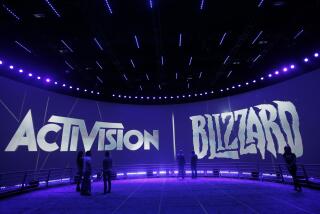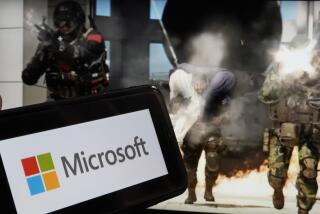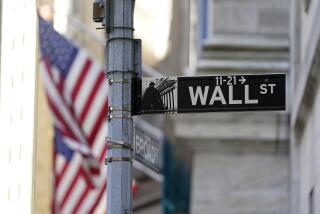Activision Is on a Roll
- Share via
Can the Hawk give Activision Inc. another lift?
The long-languishing stock of the video game publisher has moved up in recent weeks, in good part because of strong sales of Activision’s “Tony Hawk’s Pro Skater,” a game based on the legendary skateboarder and hero to untold numbers of teenage skateboard and video game fans.
The game’s sequel is hitting stores Wednesday for Sony Corp.’s existing PlayStation console--and it will go on sale for most other game players in the fall--so Activision is hoping for a holiday season encore that will further propel its growth.
But the arrival of “Tony Hawk 2” is only one factor in the rebound of Santa Monica-based Activision. Shares of several game publishers have jumped in recent weeks in anticipation of the new PlayStation 2 model that arrives in late October, even though the next version of Tony Hawk’s game for PlayStation 2 won’t be available until after this year.
Activision already has sold 3.5 million copies of the initial Hawk game, and the company expects both versions to account for about 15% of Activision’s nearly $600 million in revenue for its fiscal year ending March 31.
Even so, the stocks of Activision and some other major game firms, such as Electronic Arts Inc., tanked early this year because consumers were waiting for the new game consoles to arrive and partly because some of the companies--Activision included--posted disappointing earnings.
But besides the new Hawk game, Activision has other new titles that are predicted to be strong, such as games based on two Marvel comic book series: X-Men and Spider-Man, “which I think will do well,” said analyst Michael Wallace of UBS Warburg Securities in New York.
Activision also hopes to leverage its success with Tony Hawk by introducing games based on other “extreme-sports” athletes, such as bike rider Mat Hoffman and surfer Kelly Slater.
The Hoffman game in particular “is an important title for us,” said Robert Kotick, Activision’s chief executive. It’s key to “establishing a leadership position on the next generation of [player] hardware” in extreme-sports games, he said.
Activision also took advantage of its low stock price by repurchasing 9% of its shares during this year’s second quarter. And finally, the company is paying more attention to its profitability than it has in the past, when most of its focus was on growing sales to compete with its bigger rivals, said analyst Miguel Iribarren of Wedbush Morgan Securities in Los Angeles.
In its fiscal year ended March 31, Activision’s profit--excluding one-time charges--rose to $20 million from $15 million the prior year and $5 million in fiscal 1998. That’s decent earnings growth, but in fiscal 2000 that operating profit still amounted to only 3.5 cents per dollar of sales, which totaled $572 million that year. Electronic Arts, by contrast, earned 9.2 cents per dollar of sales last year after excluding one-time accounting items.
Nonetheless, excitement over Activision’s new games and the new game consoles has enabled Activision’s stock price to nearly triple during the last several weeks. After slumping to $5.66 a share June 29, the stock closed Friday at $14.61 a share, down 33 cents for the day, on Nasdaq.
But Activision’s stock--to use the skateboarders’ parlance--still needs a lot more air. Despite its recent run-up, the stock continues to trade below its level of five years ago, whereas the Nasdaq composite index has quadrupled during that span and the Standard & Poor’s 500 index has more than doubled.
None of that is lost on Kotick, whom everyone calls Bobby and who’s been Activision’s chief executive for nine years. He conceded that Activision erroneously thought that its performance alone would drive the stock higher. But the company, which seldom talked to pension funds and other institutional investors, now realizes it hasn’t done a good job of selling its story to Wall Street.
“The stock is not at all reflective of the intrinsic value of the business,” Kotick said. “It’s probably first and foremost a perception problem, and I don’t think we as a company have done a particularly great job at investor relations. [We need] to get out and do a better job of talking to investors.”
It’s easy to see why. Activision is the second-largest independent game publisher behind Electronic Arts, with about half of Electronic Arts’ annual revenue of $1.4 billion. Also, Activision’s 6.2% share of the U.S. game market so far this year is more than half of Electronic Arts’ 10.1% share, according to the research firm NPD TRSTS Video Game Services. And yet Electronic Arts’ total stock market value, at $6.8 billion, is nearly 20 times higher than Activision’s.
And when Activision’s stock price fell so low in April, the company adopted a “poison-pill” anti-takeover defense. Kotick won’t comment on whether a suitor approached Activision about a merger, but he said the company didn’t want a buyer to “come in and steal the business” with a price that wasn’t fair to the company’s stockholders.
After that, Tony Hawk’s game took off as a bestseller, and that “totally took us by surprise,” Kotick said. But he acknowledged that “for us to grow our earnings . . . we have to have more products in the top 50” of game sales.
Indeed, Activision’s stock price dropped so low early this year partly because Activision’s performance fell short of analysts’ forecasts. “They had some issues hitting [the profit] numbers,” said UBS’ Wallace. “There were some product delays and sales not hitting expectations, and they reorganized some discontinued product lines that were under-performing.”
Wedbush Morgan’s Iribarren, who recently raised his rating on Activision to a “strong buy,” said that about 18 months ago Activision “started to shift [its] mentality toward the bottom line,” after making a spree of acquisitions to compete more effectively with the likes of Electronic Arts.
Activision also wrote off poorly performing games to concentrate on its best sellers, “and they did a good job of upgrading their library to focus on the profitable brands going forward,” Iribarren said.
And Activision’s charges in fiscal 2000--which amounted to $54 million after taxes--resulted in a net loss of $34 million for the year, and a big chunk of the charges stemmed from Activision’s ill-fated, $26-million purchase of a company called Expert Software in 1999.
Part of Activision’s business is selling moderately popular games priced under $20 for personal computers, and Expert was in the same field. Activision figured the merger would give it more shelf space in that market, but it quickly became clear that Expert was “a loser,” Kotick said, forcing Activision to dump most of Expert’s titles and even phase out the brand.
Looking ahead, Kotick said the success Activision enjoys with “Tony Hawk 2” and its other new games will be tempered because overall game sales this year are expected to be flat compared with 1999, mainly because consumers are making the transition to the new game players such as PlayStation 2.
But investors are betting Playstation 2 will give overall game sales a spark. Sony’s new product, and other game players coming from rival manufacturers, will also have DVD movie players, can play music CDs and are expected to eventually feature Internet capabilities.
“We’re at the beginning of a new cycle” of rising game sales because of those new players, and that trend--together with Activision’s new titles--means that the company’s profit growth should really accelerate from 2002 to 2005, Kotick said.
Iribarren agreed. “At the end of the day, you have to have great [game] content,” he said, and now Activision has “whittled down its library to where it has a good set of core assets.”
(BEGIN TEXT OF INFOBOX / INFOGRAPHIC)
Video Game Battle
Video game publisher Activision Inc. has popular titles such as “Tony Hawk’s Pro Skater,” but it’s locked in fierce competition with several video game rivals. Here are their shares of the U.S. video game market through the first eight months of 2000:
Activision is in a crowded field ...
Publisher
Share of revenue from games sold, January to August
Nintendo: 23.6%
Sony: 11.7
Electronic Arts: 10.1
Activision: 6.2
THQ: 5.9
Acclaim: 4.0
Sega: 3.8
Capcom: 3.1
Namco: 2.9
Others: 28.7
... but its stock is scoring healthy gains.
Weekly closes for Activision (ATVI)
Friday close: $14.61, down $0.33
Sources: NPD TRSTS Video Game Services, Bloomberg News







